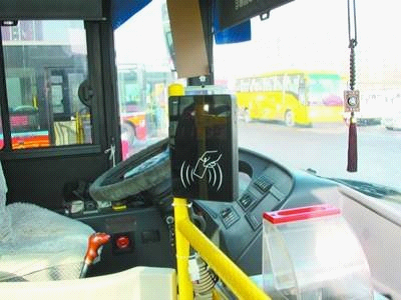Have you ever encountered such a scene in rush hours: After a flock of passengers squeezed on to the crowded bus, the ticket clerk got stuck in the tail of the bus, and then failed in an attempt to make her way out of the crowds? Finally, she had to raise her voice to ask front door passengers to transfer the bus passes backward. Then, cash and bus passes were passed by numerous hands and "flew" over the passengers' heads amid the shout of the ticket clerk, station broadcasts by the passengers themselves, and conversations. The bus was filled with buzz for the whole time. In China's first-tier cities Beijing, Shanghai, Guangzhou, and Shenzhen, busy office workers are troubled by the difficulty in buying bus tickets almost every day. Even in many fast-growing second-tier cities, such a situation is nothing new. While people are shouting for "upgrading the bus ticketing system", many companies have embarked on"intelligentization" of public transportation equipment.
In 2017, a bus ticketing system using the ME3630 module was developed. It optimizes performance and innovates functions on the basis of conventional ticketing machines and integrates theM2M concept into the most common detail of every person's life.
What if you forgot to take your cash or bus pass? It doesn't matter!
This ticketing machine supports flexible and diverse mobile payment modes. In addition to inserting coins and swiping bus passes, you can also use the Alipay app on your mobile phone to scan the provided QR code. This not only shortens the payment time to 1 second, but also prevents the embarrassment of forgetting cash or bus passes. In reality, the bus ticketing machine that supports mobile payment has taken root in multiple cities in China early since 2016. This time, the ME3630 module improves network stability to a greater extent and significantly reduces the probability of payment failure.
The ME3630 supports seven standards and all frequencies and therefore is capable to gain seamless access to the three major communications networks. The downlink rate reaches 150 Mbit/s, featuring faster speed, and less delay. After the smart ticketing machines are deployed on buses, people no longer need to worry about getting stuck in the doorway due to ticketing delay.
Q: Can a bus that charges based online sections of passengers support through tickets as in the subway?
A: Sure!
The ME3630 supports GNSS positioning technology, which allows the ticketing machine to determine the location of the bus in real time and report it. The system calculates the fare according to the line section and transfer status of each passenger and automatically deducts the fare. Passengers do not need to ticket again when getting off the bus. Therefore, the bus ticketing system is the same as the subway system in the support of through tickets. You don't need to buy multiple tickets on a trip, regardless of the quantity of line transfers.
Never underestimate this seemingly simple positioning feature. It is a good assistant for bus companies. It not only helps the bus to broadcast arrival stations in real time, but also automatically reminds the system after arrival. When vehicle malfunction or other exceptions occur, the system sends an alert and location sharing to the monitor. This is greatly helpful for rescue and vehicle transfer in traffic accidents. Operating costs and labor costs in the bus lines will be greatly reduced, and unexpected accidents will be resolved in the first place.
In addition, the positioning function also makes the smart ticketing system "timely rain" for every passenger in a hurry. The positioning module on a bus can be connected to the background of mobile apps so that passengers can check real-time locations of arriving buses by using the apps and get ready in advance. With mobile apps, passengers can schedule their bus plans more precisely, without worrying about waiting for a long time or missing a bus. In this way, taking a bus is as punctual as hailing cars using a car-hailing app.
Q: Does the smart ticketing machine have other highlights other than these functions?
A: Certainly!
Public transportation affects all aspects of society. "Be concerned and thinking about what matters to people” is implemented by all the smart terminals deployed in public transportation facilities. In addition to the basic functions, the smart ticketing machine also provides more humanized and scientific details, such as"holiday discounts" and "real-time passenger flow statistics". The flexible charging also makes passengers feel the care from society.
From the perspectives of vehicle management and dispatching, the system helps bus companies record the ticketing data, so that bus operators can measure and analyze passenger flows in each year, each week, and each day based on the ticketing data density, and then implement more immediate and efficient dispatching.
"Let the data speak"represents the greatest value of Internet of Things. Vehicle dispatching based on passenger flows is more effective in addressing the "difficulty in taking a bus", and bus commuters can no longer be squeezed as "sandwiches."

What can a bus ticketing machine do? Pass reading, positioning, and data statistics? More than that. It builds a bridge between our mobile phones and the public service system and weaves the huge bus system into a dense network. With these thoughtful intelligent terminals, our life will be more convenient, and the anxiety during rush hours will just vanish!
* Seven standards and all frequencies ensure full network coverage in the driving routes.
* Performance is compliant with vehicle specifications.
* GNSS positioning technology provides accurate location information.
- Flexible and diverse payment modes
- Data-based passenger flow statistics and vehicle dispatching
- Scientific charging modes considering line sections, transfers, and holiday discounts
- Real-time location report
- Station broadcast and arrival reminding
- Failure/exception alerts and location sharing